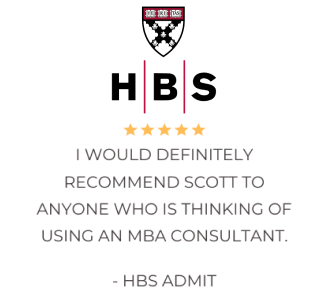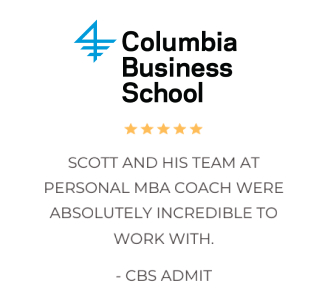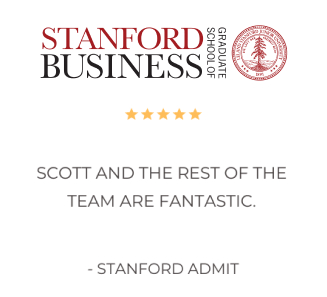Personal MBA Coach publishes detailed tips on how to approach most of the top MBA application questions (download our e-book on how to approach the M7 essays). Of course, Personal MBA Coach clients received details and customized advice through our comprehensive packages, but some key essay writing and editing basics hold true regardless of the essay question or school. To share these with you, Personal MBA Coach’s team, including former M7 admissions directors and Ivy-League-educated editors compiled this guide to successful MBA essay writing.
Effective MBA admissions essays can be different from any other type of prose. Knowing how to approach them can significantly boost your chances of MBA application success. Before going into specific essay writing tips, let’s look at the most common types of MBA essays. Understanding the type of MBA essay (and their ultimate purpose) will help you determine which personal and professional examples are most relevant, what tone you should choose, and how you can use the question to demonstrate your candidacy in the best light (and ultimately get into your dream school).
Types of MBA Essays
Goals Essay
The purpose of this type of MBA application essay is to discuss your post-MBA career goals and prove that you need an MBA to achieve them. In a goals essay, depending on the word limit, you may share some career highlights as well as your specific short-term and long-term goals. For instance, one of the Wharton MBA admissions essays invites MBA candidates to lay out their professional aspirations. When drafting this type of essay, make sure to be specific and focused. While no one expects you to commit to these goals post-MBA, you should demonstrate to the admissions committee that you have thought about your career goals and determined that an MBA is the ideal steppingstone on your path to achieve them.
Personal Story Essay
Varying in word count, this type of MBA application essay tends to be more personal. The main goal of a self-reflection essay is to get to know the real you. These essays can range from the 900-word, open-ended Harvard Business School MBA application essay to the 100-word questions Michigan Ross asks. Personal MBA Coach’s expert tip here is to stay true to yourself and consider your Personal Story. Do not write what you think the admissions committee wants to read. Write about your passions, values, failures—nothing is off limits. At the same time, you want to keep a positive mindset. If you are discussing your failure or something tragic that happened to you, make sure to present it as a story of growth. This is not a creative-writing contest—remember that you are writing your MBA application essay, and the main goal of this essay should be to convince the admissions committee that you will add a unique perspective in the classroom and on campus.
Contribution Essay
The goal of the contribution MBA application essay is to demonstrate how you will enrich the MBA experience for your peers. A number of top MBA programs currently require a contribution essay. The most notable examples of such an essay are Duke’s “Based on your understanding of the Fuqua culture, what are 3 ways you expect to contribute at Fuqua?” and Wharton’s 2nd essay: “Taking into consideration your background – personal, professional, and/or academic – how do you plan to make specific, meaningful contributions to the Wharton community?” The most effective contribution essays will give admissions committee members insight into your achievements and passions while demonstrating how you will positively impact your peers.
Leadership Essay
While evidence of leadership should be included in many different essay types, some MBA essays directly ask candidates about their leadership experience. Kellogg’s first MBA essay is a classic example of this: “Kellogg Leaders are primed to tackle today’s pressing concerns everywhere, from the boardroom to their neighborhoods. Tell us about a time in your life where you’ve needed a combination of skills to solve a problem or overcome a challenge. Which skills did you use? ” While it is great to show how you have led your peers, do not forget about humility. It is expected that your leadership style is still a work in progress. In fact, in some leadership essays, you will want to tell the reader how you wish to fine-tune your leadership style during your MBA.
Video Essay
Video essays are becoming increasingly popular among business schools’ admissions committees. For instance, Berkeley Haas introduced a video essay this year. Other schools, including MIT Sloan, have required a video essay for many years. Some schools, such as Chicago Booth, require a video essay for applicants offered an interview.
The video essay is a completely different format, and unlike all the essay types above, this is the one where you should not overedit. A few bullet points in preparation are great; however, writing out the whole script will make you appear less natural. Video essays are rather more personal, so you want to come across as approachable and show that you would be great to have in the classroom. Appearing too rigid and rehearsed will hinder your chances.

MBA Essay Writing Process
Now, let’s talk about the basics of the essay writing process. We advise our candidates to follow a 5-step process as they develop their application essays, leaving adequate time for each stage.
1. Brainstorm
Brainstorm each essay question one at a time. Now that early decision deadlines have passed, you are free to begin with the essay that seems easiest or comes most naturally to you, as your writing will improve throughout the process. In developing potential topics, consider your relevant strengths, experiences, and accomplishments: Choose those that bring the most to the table.
2. Outline
Before you begin to develop prose, outline the key points you hope to cover in a sequence that flows logically. Pay special attention to the length you will allot to each section of the essay.
3. Draft
Once you have a solid outline, begin to put together your first draft. At this stage, it is ok if your writing is not perfect. Most first drafts will be a bit longer than the final product, but make sure you have the substantive points in place and that they flow together well.
4. Edit and Edit Again
Editing is the most time-consuming part of the essay writing process, particularly if you have written too much in the initial draft. Be critical of what needs to be there and what does not, and make sure you remove extraneous or superfluous material. Fine-tune your writing to make sure that the structure, verbs, and vocabulary all serve to make your thinking clear. Avoid repetition and be concise.
5. Proof
And finally, proofread. If you are not great at spelling or grammar or even generally at writing, ask someone who is good at those things to read your essay. A fresh set of eyes is priceless for catching mistakes. Personal MBA Coach uses proofreaders for each MBA application for this reason.

5 Tips for Writing a Successful MBA Essay
1) Answer the Essay Question
This seems like a no-brainer, but many candidates write beautiful essays that do not answer the essay question. Instead of writing what you want to show off, answer the question (or make sure that what you want to show off answers the question!). While we do advise thinking a bit outside of the box and considering the why behind an essay prompt (what are they really trying to get at?) first and foremost you must answer the question.
That is one reason recycling essay copy from one school to the other is often not a great idea: While it works sometimes for schools whose essay questions are nearly identical, most often it obscures the whole objective of answering the question. Good MBA essay editing should address this, refocusing the material. So, go through your copy and make sure the answer is in there. If you are using the essay you wrote for another school, make sure you tailor it to fit and answer the pertinent essay prompt.
2) Write Authentically
Do not write what you think admissions committee members want to read. There is no one perfect candidate profile. Instead, your uniqueness will be one of your greatest selling points. Your essays should paint a clear picture of who you are, what motivates you, and what you are passionate about—genuinely. Do not feel compelled to show how you fit the mold that seemingly makes up the “ideal” candidate. If you have no desire to run a non-profit, that is ok. If you are not motivated by improving the environment, do not pretend you are. Readers will see right through this, and you could end up doing more harm than good.
3) Look at the Application Comprehensively
Essays are just one part of the overall MBA application. In addition to submitting a resume (unsure how to write an MBA resume? Check out these tips), you fill out a detailed application whose value you should use in every detail. Many schools require short essays and short answer questions and video essays as well. In addition, you have letters of recommendation. Those also should be used to your advantage to include material you may not have other opportunity or space to talk about. This means there are other places to list and highlight items such as extracurricular activities.
There is no need—or space—to try to fit this all into your essays: Focus on a few chosen facets of your passions or accomplishments to answer the essay questions and use other material in other places.

4) Keep Your Language Approachable
You should assume that terms you regularly discuss at the office—what is commonly referred to as industry jargon—are foreign to others, including admissions committee members, and they do not want to have to wade through it, trying to understand, as if it were a foreign language.
Harvard Business School has gone so far as to specifically ask candidates to not use jargon, both in the MBA application essay and the short answer questions. The best MBA essay editing will eliminate jargony language entirely and translate to readily understandable English, which helps convey what you are talking about and who you are. Particularly when it comes to showing off an accomplishment or how you added value in a business scenario, you want to make sure that technical language does not get in the way and impede your ability to clearly communicate what you did. On some occasions, it may be beneficial to ask a loved one to read your essay, though it is not always the best choice—check out this blog for a comprehensive breakdown of when it is a good idea to involve your friends and family in your MBA journey.
5) Limit Flowery Prose
Similarly, we often read complex flowery prose. By flowery we mean prose that is overly ornate, rambling, and verbose. While showing off your writing style may be the point when applying to a writer’s program, when applying to business school you should write well but in a practical and straightforward manner. Most schools want direct, substantial, detailed answers to the questions—not rambling prose. Everyone, from your grandmother to a professor of microfinance, should be able to understand your essays.
In sum, your essays should convey why you are someone others would want to study with, learn from, and eventually be inspired by. That type of person is human and down to earth. Your essays should show this.
Finally, be concise. Write to the word count. If you are having difficulty making a choice between two options, you can vet that choice, but once you have chosen your topic, during the outline process eliminate material that is not needed. It is very hard to cut 200 words from a 500-word essay and not change the overall intended impact and meaning. Trimming 30 words is one thing—though it is very time-consuming, it can be done artfully without losing much—but you cannot cut an essay in half and not lose substance that should be included.
Write Successful MBA Essays With Personal MBA Coach
Not sure how to articulate your story through various types of essays? Personal MBA Coach is here to guide you through writing your best MBA application essays! Check out our Comprehensive Packages to see how we can help!




















